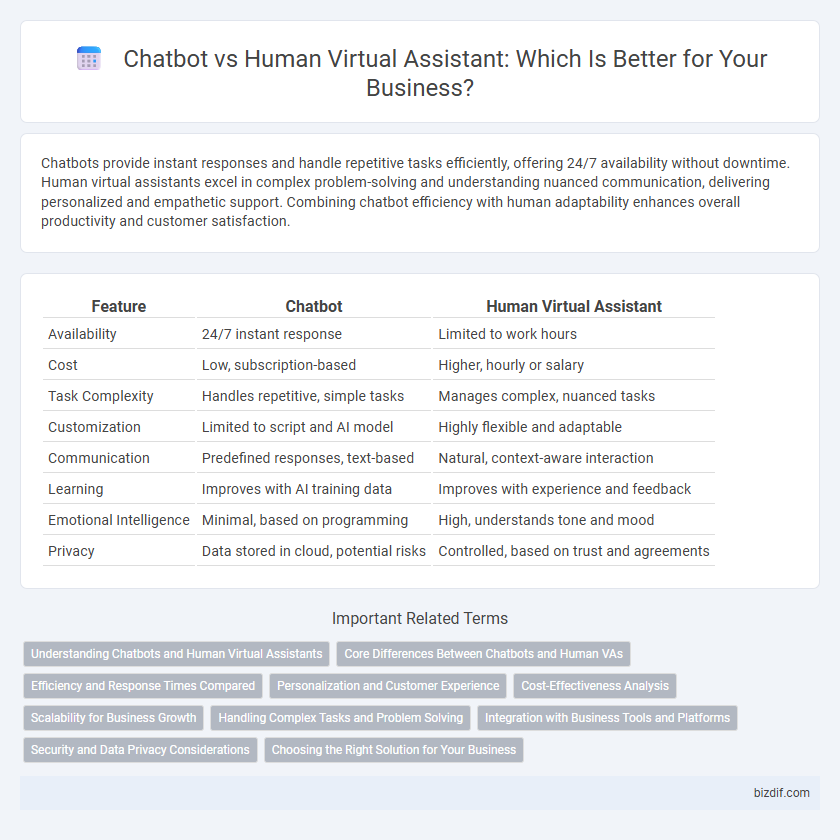Chatbots provide instant responses and handle repetitive tasks efficiently, offering 24/7 availability without downtime. Human virtual assistants excel in complex problem-solving and understanding nuanced communication, delivering personalized and empathetic support. Combining chatbot efficiency with human adaptability enhances overall productivity and customer satisfaction.
Table of Comparison
| Feature | Chatbot | Human Virtual Assistant |
|---|---|---|
| Availability | 24/7 instant response | Limited to work hours |
| Cost | Low, subscription-based | Higher, hourly or salary |
| Task Complexity | Handles repetitive, simple tasks | Manages complex, nuanced tasks |
| Customization | Limited to script and AI model | Highly flexible and adaptable |
| Communication | Predefined responses, text-based | Natural, context-aware interaction |
| Learning | Improves with AI training data | Improves with experience and feedback |
| Emotional Intelligence | Minimal, based on programming | High, understands tone and mood |
| Privacy | Data stored in cloud, potential risks | Controlled, based on trust and agreements |
Understanding Chatbots and Human Virtual Assistants
Chatbots leverage artificial intelligence and predefined scripts to handle routine inquiries, offering instant responses and 24/7 availability with limited emotional understanding. Human virtual assistants provide personalized support, leveraging empathy, complex problem-solving skills, and adaptability to manage diverse tasks requiring nuanced judgment. Understanding the strengths and limitations of both entities helps businesses optimize customer interaction and operational efficiency.
Core Differences Between Chatbots and Human VAs
Chatbots operate through programmed algorithms and natural language processing to provide instant, automated responses, making them efficient for handling repetitive tasks and scalable customer interactions. Human VAs offer personalized, context-aware support with emotional intelligence and adaptability, enabling complex problem-solving and nuanced communication. Core differences include the level of empathy, customization, and decision-making capabilities, where chatbots excel in speed and consistency while human VAs outperform in understanding intricate requests and delivering tailored assistance.
Efficiency and Response Times Compared
Chatbots deliver rapid response times by instantly processing multiple queries simultaneously, significantly enhancing efficiency compared to human virtual assistants. Human VAs provide nuanced understanding and personalized interactions but often require longer response times due to manual workload management. Combining chatbot automation with human oversight optimizes overall efficiency and ensures comprehensive support.
Personalization and Customer Experience
Chatbots deliver swift responses by leveraging AI-driven algorithms but often lack the deep personalization and emotional understanding that human virtual assistants provide. Human VAs tailor interactions based on nuanced customer preferences, fostering stronger engagement and empathy that enhance overall customer experience. Combining chatbot efficiency with human personalization optimizes service quality and customer satisfaction.
Cost-Effectiveness Analysis
Chatbots offer a highly cost-effective solution by reducing labor expenses and enabling 24/7 customer interaction without additional overtime costs, making them ideal for handling repetitive tasks. Human virtual assistants provide personalized service and complex problem-solving capabilities but come with higher hourly rates and potential overhead costs related to training and management. Businesses must evaluate the balance between upfront investment in chatbot technology and ongoing human labor costs to determine the most economically efficient choice for customer support and administrative tasks.
Scalability for Business Growth
Chatbots offer unparalleled scalability for business growth by handling numerous customer interactions simultaneously without increased labor costs. Unlike human virtual assistants, chatbots can operate 24/7, ensuring consistent customer engagement and faster response times during peak periods. Businesses leveraging chatbot technology can efficiently expand support capacity while maintaining service quality and reducing operational expenses.
Handling Complex Tasks and Problem Solving
Chatbots excel at handling routine inquiries and providing instant responses through pre-programmed scripts, yet struggle with nuanced problem-solving and complex decision-making. Human virtual assistants offer superior adaptability and critical thinking skills, enabling them to address multifaceted tasks that require emotional intelligence and contextual understanding. Integrating AI-powered chatbots with human VAs optimizes efficiency by balancing automated responses with expert handling of intricate issues.
Integration with Business Tools and Platforms
Chatbots excel in seamless integration with a wide range of business tools and platforms such as CRM systems, email marketing software, and project management applications, enhancing automation and data synchronization. Human virtual assistants offer personalized and adaptive support but may require manual setup and lack the immediate connectivity available in AI-driven chatbots. Leveraging chatbots enables businesses to streamline workflows and improve efficiency by bridging communication across multiple digital ecosystems.
Security and Data Privacy Considerations
Chatbots rely on automated algorithms and encrypted data protocols to handle user interactions, but their security risks include potential breaches through software vulnerabilities and limited contextual understanding of sensitive information. Human virtual assistants (VAs) offer enhanced discretion and judgment when managing confidential data, though they require strict adherence to privacy policies and secure data handling practices to prevent insider threats. Organizations must balance automation efficiency with robust security measures, implementing multi-factor authentication and regular audits to safeguard client information.
Choosing the Right Solution for Your Business
Chatbot technology offers scalable, cost-effective customer interactions through AI-driven automation, ideal for handling repetitive tasks and immediate responses. Human virtual assistants provide personalized support, adaptable problem-solving, and empathetic communication, essential for complex inquiries and relationship building. Selecting between a chatbot and human VA depends on business needs, volume of interactions, and the desired balance between efficiency and personalized service.
Chatbot vs Human VA Infographic

 bizdif.com
bizdif.com